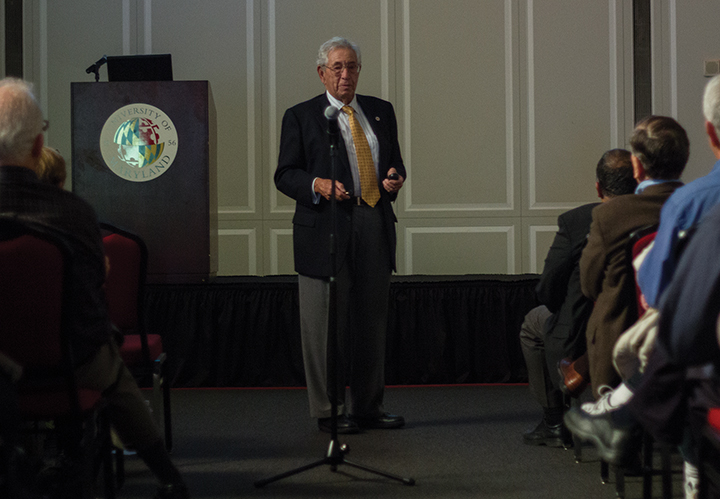
Robert Fischell, a retired biomedical engineer and university alumnus, talked about four of his inventions he hopes will improve patients’ lives.
Robert Fischell’s devices have saved countless lives around the world. Yesterday, he gave faculty, staff and students a glimpse at four of his prospective inventions, which he hopes will soon help patients who suffer from heart troubles, epilepsy and migraines.
About 200 listeners gathered in the Samuel Riggs IV Alumni Center for “Medical Technology for Humanity, Fun and Profit,” to hear from the biomedical engineer who established the university’s Fischell Department of Bioengineering and the Robert E. Fischell Institute for Medical Devices.
This was the second lecture Fischell — who won a $1 million TED Prize in 2005 for his migraine research — has given at this university, in what Provost Mary Ann Rankin said she hopes will be an annual event.
Fischell first described his stent improvements, which help open coronary arteries to reduce blockage. His stents are used more often than any other medical devices in the world, he said.
Previous stents had about a 50 percent failure rate because the arteries would close back up, but Fischell said his stents had no failures in a clinical trial of 159 patients in Europe and Brazil. Flexibility and a tapered cone-shaped end were the keys to his successful devices; flexibility allowed the wires to get around curves in the arteries, while the tapered point guided the device through blood vessels that were 99 percent closed.
Fischell said he expected the stents to gain approval in Europe this month, but it will be a while until Americans have access to them. He said his company cannot yet afford the 1,000 test cases and one-year follow-up the Food and Drug Administration requires. But once the technology does hit the States, he said, doctors will see economic advantages.
“If they can do twice as many cases and are paid by the case, it’ll be a huge financial success,” Fischell said.
Using one of his companies, NeuroPace, Inc., the inventor also helped design a device to help combat epilepsy, which 2.3 million Americans have. Doctors can replace a piece of cranium bone with a device that pinpoints the area of the brain that causes epileptic seizures and then turns that area off when the stimulations warn of a seizure.
Once installed, the machine cannot be seen, and patients can continue their lives as normal.
Fischell said epilepsy drugs do not last and cannot cure the condition, but his device has cured 15 percent of patients. His system is awaiting approval in the U.S. because the FDA said titanium in the devices might cause brain problems.
Fischell also established Angel Medical Systems, which his granddaughter named, and invented a system that predicts heart attacks. The AngelMed Guardian System tests heartbeats every 90 seconds and can detect a heart attack even before symptoms arise. Patients feel buzzing in their chests, and a pager-sized device begins beeping and flashing, alerting them to call their doctor or 911.
Those who use the technology receive treatment within one hour — before heart muscle can die — in contrast to the four-and-a-half or more hours it takes heart attack victims without the warning device, Fischell said.
Fischell said 90 percent of device owners said it improved their quality of life because they didn’t need to worry about an unexpected heart attack.
The device has been approved in every country except the U.S., Fischell said, because the FDA worries the heartbeat data might confuse cardiologists.
The final device Fischell presented helps relieve migraines. About 36 million Americans suffer from migraine headaches, he said, and 60 percent of those who take medication for migraines still experience pain.
Rather than using drugs, Fischell invented a device to send an electric pulse to the brain to depolarize the neurons that cause headaches. The signal sends in one-tenth of a millisecond, and the pain goes away within 15 minutes, he said.
Fischell said there is no possibility of adverse effects from the device because a similar but more powerful device used on depression patients has had no repercussions. He hopes to gain FDA approval by the end of the month.
The inventor ended his lecture with philosophies, encouraging students to find opportunities and work hard.
Senior mathematics major Tricia Sessions said Fischell’s advice and accomplishments inspired her to look beyond her major.
“I liked that he started in physics [with his degree] and then did something totally different,” Sessions said. “I like that I can think of a different career instead and still be successful.”
Sessions was not the only student to think about different career paths. Junior electrical engineering major Eashan Samak said he switched his major from bioengineering after hearing Fischell speak last year.
“I changed my major because of him,” Samak said. “I want to invent and make a difference, and it’s inspiring to see someone already making a difference.”



